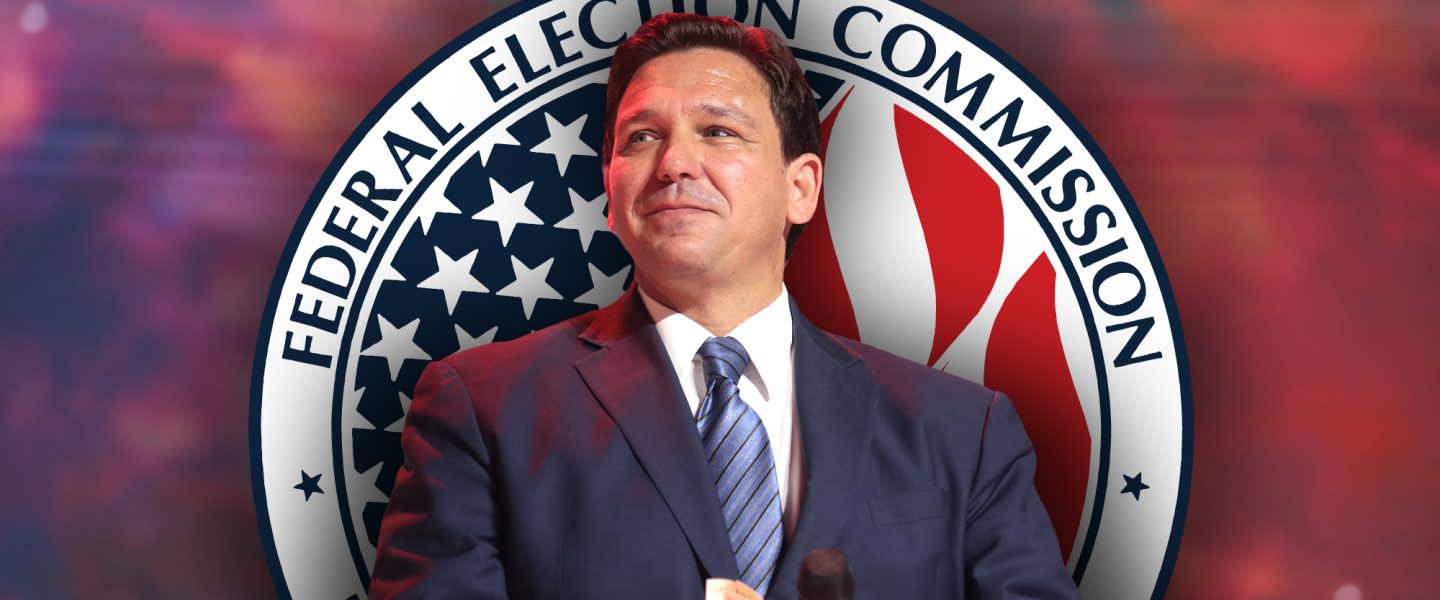Watchdog Group Files FEC Complaint Over DeSantis’s $80M Campaign Finance Scheme
The commission responsible for enforcing campaign finance law is refusing to do its job, and some politicians are taking full advantage.
|
Listen To This Story
|
Alleging that Florida Gov. Ron DeSantis (R) blatantly flouted campaign finance laws by funneling tens of millions of dollars from a state campaign to a super PAC supporting his presidential campaign, a campaign finance watchdog is calling on federal regulators to investigate the matter and to prohibit the funds from being used in the Republican primary.
The Campaign Legal Center (CLC) filed a complaint with the Federal Elections Commission (FEC) this week that accuses DeSantis of violating the ban on so-called soft money. Soft money, or money raised outside the scope of federal campaign finance law, cannot be used to seek federal office.
“Soft money undermines federal campaign finance laws,” Saurav Ghosh, director of federal campaign finance reform at CLC, said. “Laws banning these funds from being used to seek federal office are there for a reason — to prevent corruption, promote transparency, and ensure that wealthy special interests can’t rig the system even further in their favor.”
The group is saying that it is these laws that DeSantis is circumventing. As WhoWhatWhy reported, the governor turned over control of his state political action committee to a close ally in a transparent attempt to dissociate himself from the PAC and make its imminent transfer of funds appear above-board.
DeSantis is only the latest politician to flout campaign finance law. Former President Donald Trump raised money through a leadership PAC before transferring those funds to a super PAC.
“We now have the two leading candidates for president of one of the two major parties running and raising money in a way that is illegal under federal law,” said Erin Chlopak, senior director of campaign finance at the CLC.
In both cases, candidates ignored the Supreme Court’s stipulation that super PACs should spend independently from the candidates they support.
“The independent piece was crucial to the Citizens United decision. It was the basis for the court to conclude that it wouldn’t be corrupting because the money wouldn’t be coordinated with candidates so it wouldn’t be like giving a contribution in an unlimited amount,” Chlopak said. “It’s hard to even conceive of how they would have been able to reach that outcome without that premise.”
In practice, Chlopak said, super PACs and candidates are often closely linked, are staffed with family members and former employees of the candidate, and receive funds raised by the candidates themselves, which, by definition, does not make them independent.
“Every year we see new and more creative ways that these PACs find to use them as ways to do what they wouldn’t be able to do,” Chlopak said.
Experts note that the FEC is at least partially responsible for candidates bending and breaking existing rules.
“The agency responsible for administering and enforcing federal campaign finance law all too frequently fails to do its job, and that’s the Federal Elections Commission,” Chlopak said. “They have developed a well-earned reputation for not enforcing the law.”
The FEC, she continued, construes its own authority in the narrowest possible terms and then refuses to apply it, sometimes invoking its own interpretation of the Constitution.
The reason for their inaction is that the Federal Election Campaign Act structured the FEC so that no party could have more than three seats on the commission. In practice, Chlopak said, the commission usually has three Democrats and three Republicans. It often deadlocks over ideological issues. Republican commissioners in particular interpret the FEC’s authority very narrowly.
This dysfunction serves as a “signal to candidates and other political players that if you want to push boundaries, you’ll probably get away with it,” Chlopak said.

